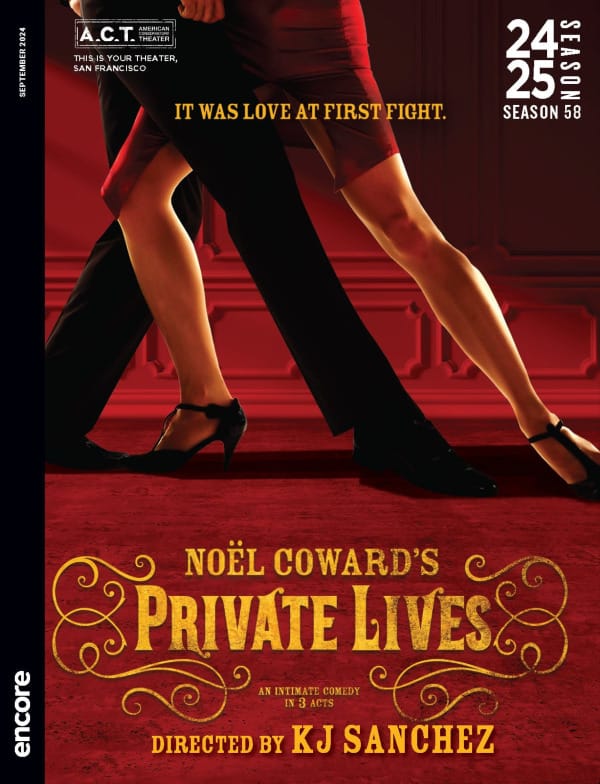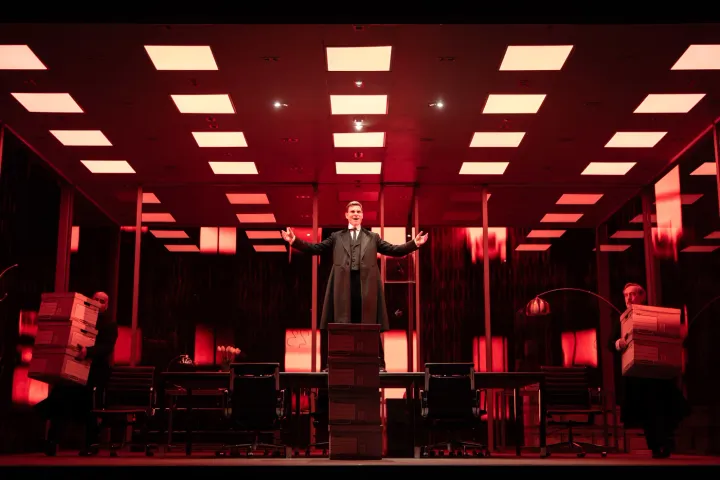September 12 – October 6, 2024 | Toni Rembe Theater
In This Program
- Show Program
- A Comedy of Ill-Manners
- Noël Coward in San Francisco
- About the Playwright
- The Company
- Private Lives Throughout the Years
- Print Edition
- More about A.C.T.
A.C.T’s House Rules of Play
Welcome to A.C.T., San Francisco. This is your theater.
All and any laughter is welcome. Laughter from many that can make a whole room shake. Laughter that is a beacon of any one person’s connection to the story told. And laughter that betrays nerves as a story builds tension. Please laugh and let others around you laugh. It is why we have come together.
We encourage all response. You, the audience, are part of the storytelling equation. Feel free to express yourself and let those around you express themselves. We are building a community with each performance.
Theater is alive and precious in that aliveness. The stories are honed and rehearsed and told with—not just to—you, the audience. If you miss a phrase or two, please know that the show will take care of you. It’ll come round again to catch you up and pull you forward. You can trust in the craft, so you can enjoy yourselves.
We ask that you turn off your mobile devices during the performance. This is out of respect for us all coming together to be part of a story told in this space and in living time.
Please share the fun. We ask that you save taking photos or video to before and after the performance and during intermission. We love seeing posts on social media: our programs held high among friends, floating before the set or curtain or lobby spaces. Tell folks about your experience. These shows have short runs and then are gone.
We encourage you to be present, mindful, and together in these spaces. Be kind to your neighbor and fellow theater lover. Help nurture and welcome new and young theater goers; for some this is their first time seeing a play. Give each other room, but also smile and say hello, as you pass on the way to your seats, or at intermission standing in a line, or as you walk out into your city.
Again, welcome to A.C.T. This is your theater.

From the Artistic Director
Welcome, friends, to your theater!
We are kicking off the 24/25 season with Noël Coward’s Private Lives. The season explores stories over the next year on our stages through a lens of “why not?” Not the snarky addendum to “I know you are, but what am I?” but rather an inspirational “why not?” that stretches our imaginations.
George Bernard Shaw wrote “You see things and you say ‘Why?’ But I dream things that never were, and I say ‘Why not?’” This is the epigram playwright and dear friend Craig Lucas employs to introduce his play A Whynot Christmas Carol, A.C.T.’s new adaptation of the Dickens, premiering in November.
The Dickens classic is a play within a play, set in a fictional town called Whynot. A town where a group of artists dream and toil their way together in a theater to put on A Christmas Carol. They are making a new version of a long-told story to share.
Zayd, a young child character who plays Tiny Tim, in a brief conversation with their mother that starts with ghosts and leads to storytelling and ritual, says:
“You know why we keep going back to the same stories over and over…Rituals…You know what rituals are?…Someone shows you how to repeat something—like brushing your teeth—and you keep it alive. And then you teach somebody else. And that way things that really matter are passed down from those who are someday, you know, gone to those who aren’t here yet.”
(You can see why I am excited to get into rehearsals for A.C.T.’s next show.)
Meanwhile we gather in our town, in our theater, to attend director and dear friend KJ Sanchez’s version of Noël Coward’s Private Lives. We are here to enjoy and celebrate this 90-year-old play that remains relevant and alive in its wit, cruelty, and exploration of marriage and love. The tango that KJ and her company have added are to help us hear this classic play anew, to elevate, and to turn what’s on the page into living ritual.
I hope you enjoy Private Lives, and your time at the Toni Rembe Theater in San Francisco. I’m happy to share this production and our coming season. I’m happy to be again dreaming of possibilities together.
Why not?!
Pam MacKinnon
Artistic Director
From the Executive Director
In our 2023/24 Season, we were thrilled to welcome into our theaters a huge number of audience members who were new to A.C.T.—more than 70% of our total audience who came through the doors were here for the first time. This is so exciting to us as we continue to build back after 2020. If you’re one of those people who joined us for the first time in the last season—thank you! We’re so glad you gave A.C.T. a try and then decided to come back again for Private Lives.
If you’re one of our subscribers or donors or long-time ticket buyers, thank you for your support of A.C.T.! We couldn’t create the art we create, and support the communities we support, without you. We depend upon your loyalty to continue making theater that inspires and provokes joy, laughter, conversation, reflection, and more.
If this is your first time at A.C.T., I hope you’ll check out more of what we offer: a full season of mainstage programming (act-sf.org/whats-on), classes and training for all ages through our Conservatory programs (act-sf.org/training), space rentals for all sizes and needs (act-sf.org/rentals), behind-the-scenes benefits for our generous donors (act-sf.org/support), our work in schools and community organizations across the Bay, and more.
To everyone: A.C.T. is YOUR theater. Thank you for choosing to be here with us.
Enjoy the show,
Jennifer Bielstein
Executive Director
American Conservatory Theater
presents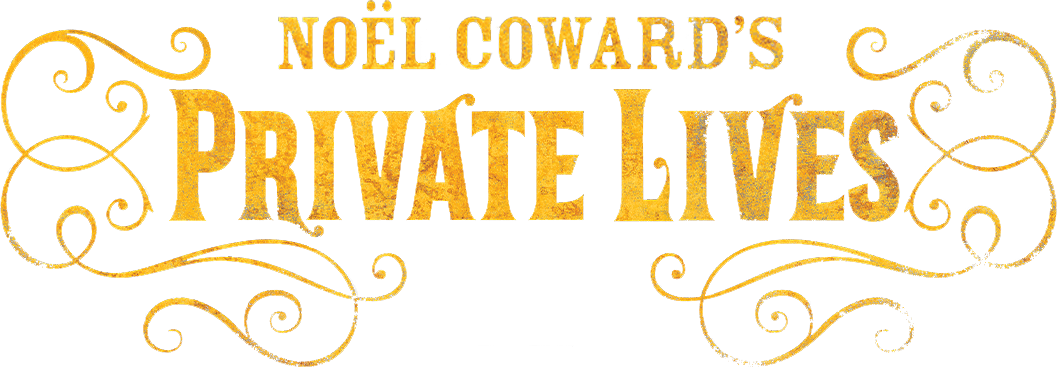
Directed by KJ Sanchez
Cast
Hugo E Carbajal
Elyot Chase
Gianna DiGregorio Rivera*
Sibyl Chase
Brady Morales-Woolery†
Victor Prynne
Sarita Ocón
Amanda Prynne
† Fight Captain
Understudies
Livia Gomes Demarchi
Sibyl Chase / Amanda Prynne
Bacilio Mendez II
Victor Prynne / Elyot Chase
Stage Management
Laura Hicks
Stage Manager
Julia Formanek
Assistant Stage Manager
Creative Team
Tanya Orellana
Scenic Designer
Jessie Amoroso
Costume Designer
Scott Bolman
Lighting Designer
Jake Rodriguez
Sound Designer
Lisette Perelle
Tango Instructor
Joy Meads
Dramaturg
Katie Craddock and LeeAnn Dowd
Casting
A.C.T. Producing Team
Andy Chan Donald
Associate Artistic Director
Louisa Liska
Director of General Management & Operations
Amy Dalba
General Manager
Martin Barron
Director of Production
PRIVATE LIVES © NC Aventales AG 1930
Special Thanks to our Production Sponsors
Season Presenters
Jerome L. and Thao N. Dodson
Executive Producers
Daniel E. Cohn and Lynn Brinton; John L. Garfinkle; Jeri Lynn and Jeffrey W. Johnson
Producers
Luba Kipnis and David Russel; Cherie Sorokin
Associate Producers
Judy and David Anderson; Dr. Barbara L. Bessey; Linda K. Brewer; Dr. Allan P. Gold and Mr. Alan C. Ferrara
Corporate Production Sponsor




A Comedy of Ill-Manners
An interview between A.C.T. Artistic Director Pam MacKinnon and Private Lives director KJ Sanchez
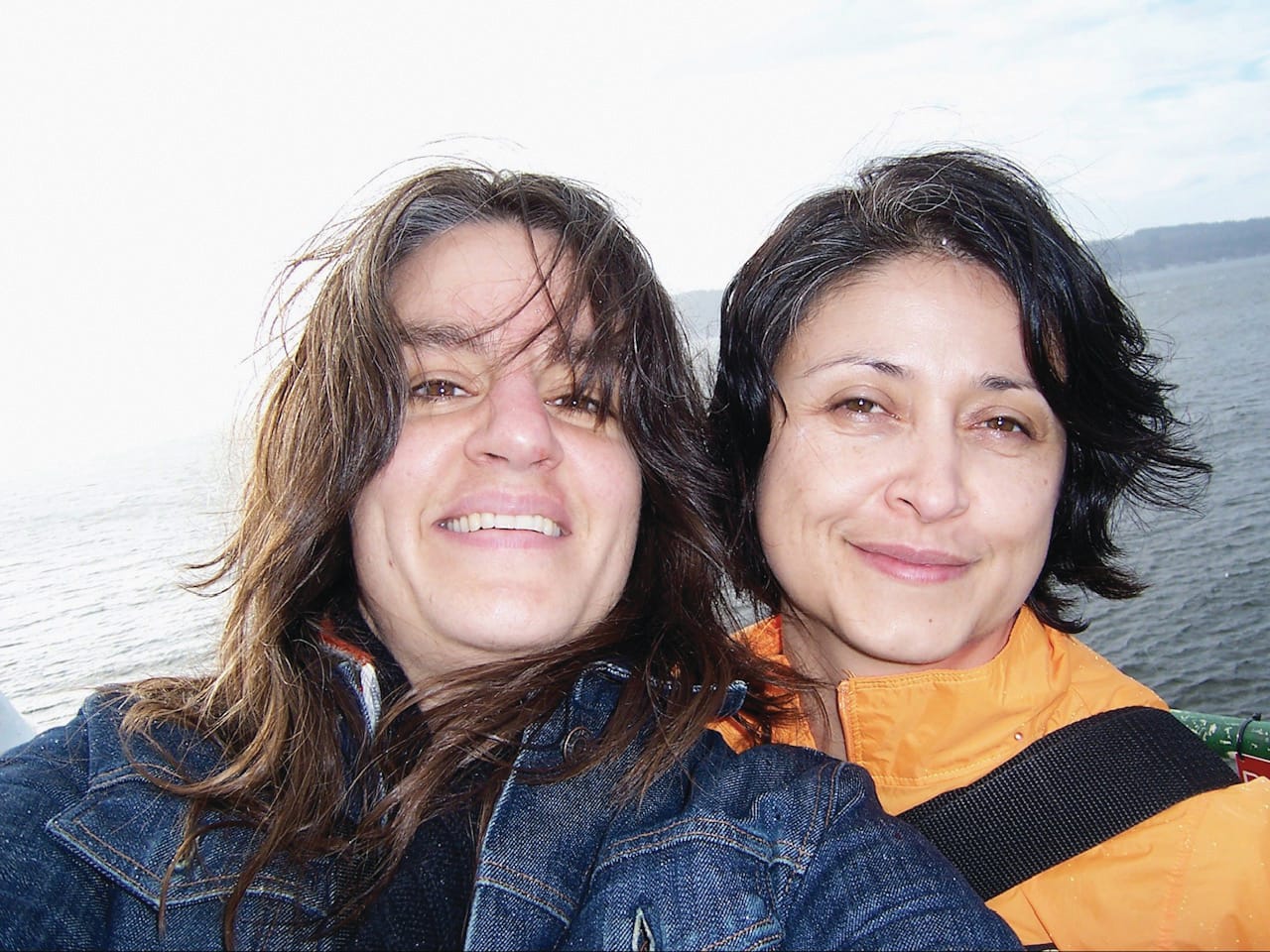
Pam: KJ Sanchez, I’m super excited to have you at A.C.T. directing Noël Coward’s Private Lives. You’ve had several previous experiences both as an actor and a director with this play, right?
KJ: Yes, I’ve had a long relationship with this play. I think I have worked on Romeo and Juliet and this play more than any other plays. It’s funny, that as a baby of the avant-garde, one of the plays I’ve spent more time with is Noël Coward’s Private Lives. I was thinking this morning about how the lore is that he wrote it over a weekend.
Pam: Right.
KJ: I think that my assumption before I spent time with it was like, oh, this is thin, this is slapdash, here are some jokes and some rude bits and some funny bits and what’s going on with the relationship between men and women in this play? But then I realized, Coward and Gertrude Lawrence, his pal of many years, performed it at theater after theater after theater, polishing it over and over. They perfected those jokes. They honed its structure.
Noël Coward and Gertrude Lawrence, their chemistry was so well practiced because they had known each other for so long and they wrote to each other constantly, and they were constantly throwing each other playful little digs and little jabs. That was part of their love and humor with each other. And so, this spiky, funny, witty, dry relationship was so well crafted. So when you get inside any of the characters in Private Lives you can feel that.
Pam: Would you define this play as a comedy of manners?
KJ: Can it be a comedy of ill-manners? It’s that familiar tension between what is good for us and what feels good. “I should be with the person who treats me well and is kind and is polite to everyone…but what feels really good is to be with this jerk who says all the wrong things.”
Pam: I love that, right. And hence the title. “We’re on our honeymoon. We are in love. We are committed to each other and starting a new life together. Oh, but YOU are here too. How loud are my feelings for YOU?”
KJ: And each time I find something new. You’ve known Albee’s work for so long in different iterations.
Pam: Yes, more than twelve productions of Edward’s plays.
KJ: Do you see connections between Private Lives and Who’s Afraid of Virginia Woolf?
Pam: Absolutely. Both plays, one ninety years old, the other sixty, are deep, and still revelatory explorations of marriage. They create and reinforce a genre. These mountainous plays of virtuosic performance that if you do them right should level both actor and audience by the end of the night navigate to the marrow: adult commitment and love, and ironically the loneliness within these commitments. The underpinning of love needs to hold firm the surface that can be affectingly nasty and even brutal.
KJ: I played Sibyl in Private Lives, and then I also played Honey in Who’s Afraid of Virginia Woolf?. And there are so many similarities. No one’s being mean because they want to be mean. We are just such lonely people. We are so desperately lacking in confidence, and love, and security that we have to either excessively perform joy or “carefree-ness” or lash out or fall apart or be brittle.
Pam: Edward Albee also constantly went back to writing about marriage. What do people do in their own homes is always just very, very meaty. These plays are voyeuristic and performative.
KJ: And both men writing about heterosexual relationships.
Pam: Right, right, exactly. Two gay men, constantly going back to the dynamic between men and women, and through the years, people have said, “Well, actually Virginia Woolf is really a quartet of four men.” And Edward just would always just say, no, no, no.
KJ: I think the same is true for Private Lives. There was a period, I think it was the late 80s, early 90s where productions were highlighting the coded messaging and playing Elyot as very coded and gay and Amanda being masculine and different. I’m not sure we have to be that simple.
Pam: Yep. Yep. Here’s to the messiness and complexity! So this is your fourth wrestle with Private Lives. And you’ve you set Act 1 in Argentina, rather than the French Riviera, and Act 2, instead of being Amanda’s Paris apartment, it’s Amanda’s apartment in Montevideo, Uruguay.
KJ: And still set in relatively the same time period of the late 1920s, early 1930s. And I chose Argentina because at that time, there were so many similarities to when Coward was writing. At that time, Argentina was one of the wealthiest countries in the world. But they were about to have their own major economic crisis and lose everything. So, there was this sense at that time of this desperate gaiety. “We don’t have any cash anymore, but we’ve traveled the world, we’ve read and we’ve seen, and we’ve danced, and we’ve laughed, and we own apartments in major metropolitan cities. We fear that there’s something absolutely terrifying around the corner, but let’s laugh at it. Let’s be gay and let’s pretend like none of it is happening.”
Pam: A dance on a precipice.
KJ: Exactly. And when Noël Coward and Gertrude Lawrence built this piece, they had baked in songs that they would sing in Act 2. These were Coward’s pop tunes. The audience got to see them show off some of their skills. I was attracted to bringing tango dancing in because it’s rooted in Argentina and also that push-pull of relationships in men and women and all of that, that is a perfect parallel with what Coward’s doing, but it also gives us a chance to just feature the talents of our cast.
Pam: Seems like a good segue to talk about your cast. You’ve worked with all four actors before, three of them even on a production of Private Lives.
KJ: We’ve done a lot of work together in a lot of different places. So I met Gianna, Hugo, and Sarita when we did the premiere production of Octavio Solis’s Quixote Nuevo at Cal Shakes, and we all fell in love with each other. Then I worked with Hugo on River Bride at Pennsylvania Shakespeare Festival. I cast Hugo, Sarita, and Brady in Private Lives at Arizona Theatre Company. Gianna, Hugo, and I took Quixote Nuevo to Hartford Stage in Connecticut and the Alley Theatre in Houston and Sarita joined us for the production at Huntington in Boston. In my production of Romeo y Juliet, Sarita was Romeo, Gianna was Juliet, Brady was Benvolio, and Hugo was Tybalt. And we just did American Mariachi together at the Alley. We’ve spent a good long while together. Which has been an incredible gift.
Pam: Did any of your actors have any experience with tango before stepping into the project at Arizona?
KJ: No.
Pam: Can you talk a little bit more about what you want to further explore with tango at A.C.T. in your Private Lives?
KJ: Tango is a dance that’s improvised, but improvised off of a lot of rules. There’s always an if/then with every step. If I do this one thing with my foot, it triggers six moves. And that’s how the text works: one character says something that triggers a beat changes, and a sequence of responses. In order to make the quick shifts in direction, the actors need to be internally on tilt at all times, so that you can move left, right, forward, and backward. You can never get back on your heels because you can’t anticipate where you’re going to go until that cue is given, and then you immediately go. For both tango and text, the audience can’t know where the two dancers are going to go next. So, what we’re witnessing is as close to real presence as we can get. [Tango instructor] Lisette [Perelle] is choreographing the moves, but to be performed and felt as if there’s total improvisation, so that the dance is as alive as the lines are. We know that Hugo’s always going to say the same line in the same place, but how it’s delivered is still very much alive.
Pam: How about music in the show?
KJ: The music is relatively true to the time and genre. The first act’s music is closest to the late 20’s, early 30’s. Then in the second act, the music sneaks into later decades. And there are also theatrical moments when the music and lights can represent the character’s internal energies, and in those moments, the music is contemporary. Because I also want to connect the character’s struggles with our feelings today. There’s the diegetic music, which is period, that’s coming out of the record player that they dance to. But then when there’s a fight or then when there’s an emotional flip, we see and feel and internal energy. And our amazing sound designer, Jake Rodriguez, is that perfect designer because he so seamlessly can float from diegetic to theatrical, based on the emotional landscape of the moment.
Pam: Yeah, definitely another active dramaturg.
KJ: They’re in Amanda’s apartment in Act 2. So the lighting and theatrical sound is almost like Amanda’s entire apartment becomes alive, at times reflecting Amanda’s psychological journey through that act. Because that’s the thing we have to figure out, right, is: when we watch it, we wonder (or at least I wonder) about how a woman that’s as strong as Amanda stays with somebody like Elyot? And how does she, for lack of a more sophisticated way to say it, how does she put up with him? And vice versa, of course. Amanda throws some gut punches as often as Elyot, so that’s something we’re tracking too. And every physical event is started by Amanda.
Pam: Yes, I was very struck by that in Act 2, when I saw your production in Arizona last year.
KJ: [Scenic designer] Tanya [Orellana]’s designed this beautiful apartment, but it also is the structure of a cage. They ran away and put themselves inside a little cage to battle it out. They don’t go for walks. They don’t go to the beach. They don’t go out to dinner. They stay in their little cage and they love and they fight.
Pam: I’ve often said that if George and Martha in Who’s Afraid of Virginia Woolf?, if they just had a cat, even a feral cat and they put food out on the porch, it would be better. That would have been a release. They just need a little pressure valve…but the playwright knew better, and so we touch these great plays decades later.
KJ: Yeah.
Pam: Okay. Thank you, KJ.
KJ: Oh my God, that was so fun. What a good primer to get me ready to start rehearsal soon.
Noël Coward in San Francisco
By Brad Rosenstein
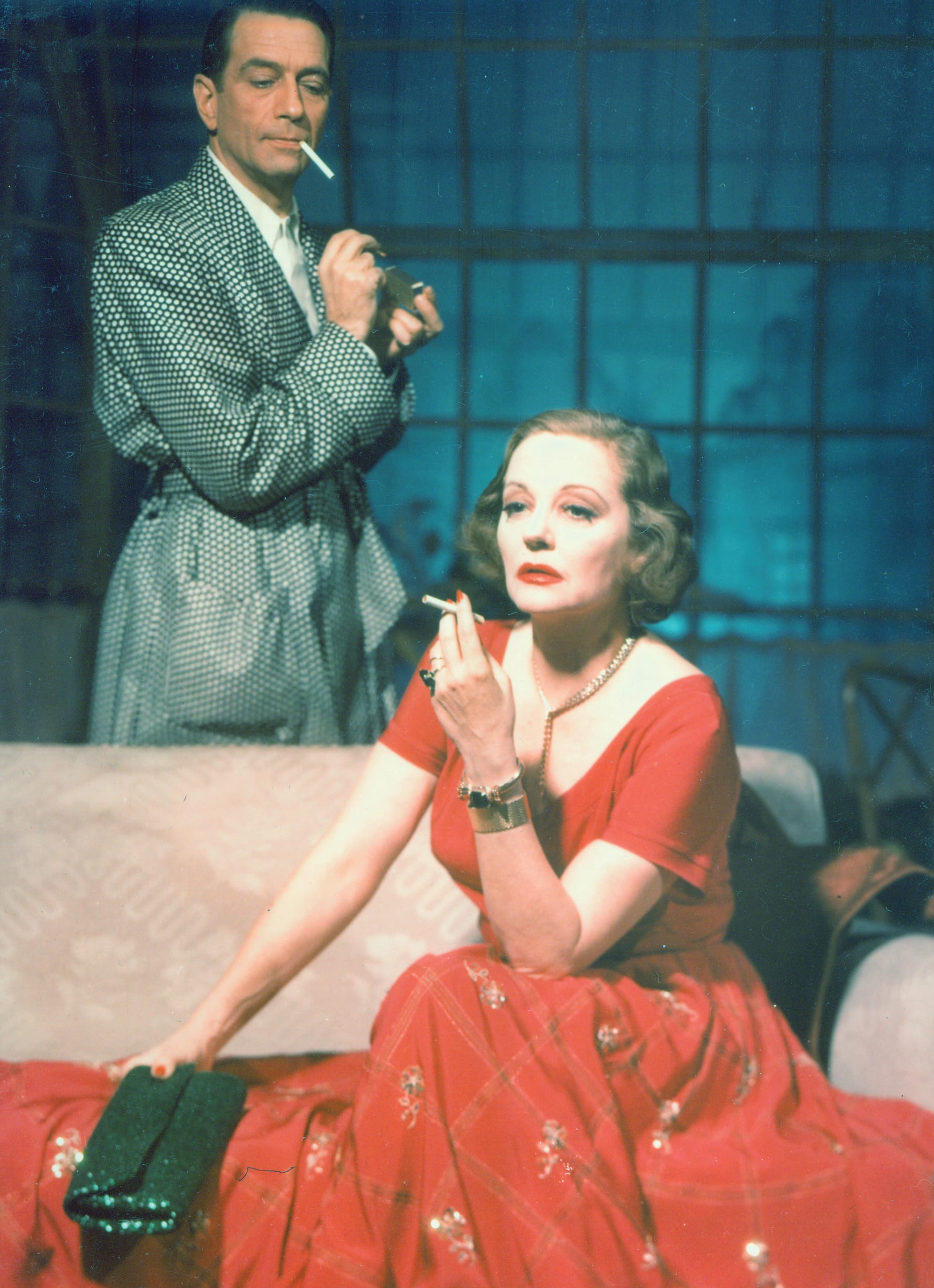
As this new production of Noël Coward’s Private Lives makes its bow at the Toni Rembe Theater (formerly the Geary), it marks a notable return by Coward not just to San Francisco, but to the same street where his work has been seen here most often and which The Master himself frequented in his lifetime.
In researching the first of many exhibitions I’ve now curated about Coward, I was delighted to discover that San Francisco was a very significant place for him, both personally and professionally. He first visited in 1926, staying at the Fairmont Hotel, and even though literally on the verge of a nervous breakdown, he fell in love with the city. He thought it was one of the few great theater towns in America, and returned many times on his visits to California or while en route to points across the Pacific.
San Francisco returned the admiration: since the late 1920s his plays have rarely been absent from local stages, and in fact the city may be second only to New York in frequency of presenting his work in the U.S. The first Coward play to be produced in the Bay Area was a 1927 production of The Vortex at The Fulton Theatre in Oakland, just two years after Coward first made his name with the play in New York. The cast was led by Marjorie Rambeau, a San Franciscan who was by then an established star on Broadway and in silent films.
During Coward’s lifetime, the Curran Theatre, right next door to A.C.T. on Geary Street, was the playwright’s favored San Francisco home for his work. Productions of some of his greatest New York hits often toured here with their original Broadway casts, including his operetta Bitter Sweet starring Evelyn Laye in 1935, and the Clifton Webb-Peggy Wood-Mildred Natwick Blithe Spirit in 1944. The Curran would be the site of several Coward milestones: his very last performances with Gertrude Lawrence took place there in 1948 (when he filled in for an ailing Graham Payn in Tonight at 8:30), and some of Coward’s final stage appearances in North America also graced the Curran in 1958, with his double-bill of Nude with Violin and Present Laughter.
Private Lives was originally slated to make its San Francisco premiere in December 1931. Otto Kruger and Madge Kennedy had assumed the roles of Elyot and Amanda on Broadway following Coward and Lawrence’s departure from the original New York cast, and soon began a highly successful national tour on the Erlanger circuit. But the West Coast performances were abruptly cancelled when MGM released its remarkably speedy production of the film version, starring Norma Shearer and Robert Montgomery, in early December. Although taking a number of liberties with the play (Coward deemed it only “passable”), the film was a smash, packing them in locally at the Fox Theatre, San Francisco’s legendary movie palace. The film critic for the Chronicle even remarked on the oddity of seeing the movie version of a recent Coward hit in San Francisco before it had ever premiered on a local stage.
But the Bay Area’s interest in Coward was so keen, especially following Private Lives’s triumphant 1930 debut in London, that residents couldn’t wait to sample the playwright’s latest work. In early February 1931, Noël and Gertie had only just opened in the play on Broadway when the script was given its first public hearing in San Francisco, in the form of a reading “by Mrs. Guy Stevens Farrington, of the faculty of the University of California,” at the Paul Elder Gallery, 239 Post Street. This “intimate comedy of married life,” confided the San Francisco Examiner, “is said to be the author’s wittiest play.” Other public readings would follow later that year, presented by everyone from the Women Hotel Greeters of San Francisco to the Oakland Women’s City Club. Amateur productions of Private Lives would flourish throughout the Bay Area in the 1930s, ‘40s, and ‘50s, a testament to Coward’s enormous local appeal and popularity.
At the professional level, Coward and Lawrence’s widely distributed audio recording of excerpts from the play, the movie version, and a nationally broadcast radio production of Private Lives with Orson Welles and Lawrence had all further imprinted the play on public consciousness. As early as 1936, San Francisco theater critic John Hobart would comment on a current amateur production, “the lines…are still amazingly funny. What’s more, the lines are funny even though they are familiar. In 1936, Private Lives seems almost as full of quotations as Hamlet.” Just six years after its debut, the play had already become a classic. The great success of Otto Kruger and Madge Kennedy on tour in the footsteps of Coward and Lawrence also had demonstrated vividly that Private Lives was no mere star vehicle, but a play of real substance and lasting value.
As if making up for its somewhat scattered unveiling of the play in 1931, San Francisco in 1948 would be a pivotal tour stop for one of the most successful productions of Private Lives ever mounted, one that remains indelible for many Coward fans. Tallulah Bankhead was a major star of stage, screen, and radio, and her brilliant performance as Amanda burst like a bombshell on the stage of the Curran Theatre. But it was not simply Bankhead’s show: she was amply partnered by a razor-sharp Donald Cook as Elyot, future star Barbara Baxley as Sibyl, and even Therese Quadri (the maid Louise in the original 1931 New York production) reprising her role. Tickets for the five-week run became impossible to come by, and the production would ultimately tour to all but three states across the U.S. before landing on Broadway. Best of all, the play came across brilliantly, and added lustre to Coward at a time when his reputation was on the wane.
In the wake of what Coward termed “Dad’s Renaissance,” his overwhelming return to public favor in the 1960s, his work began to be rediscovered by yet another new generation of theatermakers. A.C.T. was no exception, and its 1972 production of Private Lives remains one of its most notable. Featuring Michael Learned and Paul Shenar as Amanda and Elyot, this incarnation is especially remembered for its director, Francis Ford Coppola. The Bay Area resident was already an Oscar winner, but seemed an unlikely choice to guide the material: he had little experience in theater and reportedly had never seen a Coward play.
But Coppola would soon surprise everyone. He would frequently disappear during rehearsals to go to Los Angeles to edit his new film, annoying the company. As Michael Learned remembers: “We were arrogant about Hollywood, as you can be when you’re in the theater. We’d block all the scenes the way we thought they should be, then Francis would come back and say, `This is total shit, do it my way.’ Of course, he was right. And the film he was editing was The Godfather. That put us in our place.” The production was the surprise hit of the season, as prized for its psychological depth as its effervescent sense of fun. “The results are astonishingly fresh and splendidly imaginative,” noted reviewer Stanley Eichelbaum, “quite the best show that A.C.T. has given us this year.” Among Coppola’s commendable touches were the “superb” performances of Jay Doyle and Deborah Sussel as Victor and Sybil, two roles that can often be reduced to mere foils for the leads; Robert Blackman’s lovely Art Deco set for Amanda’s apartment, which broke apart during the fight scene as if in sympathy with the protagonists; and Coward’s songs performed live between the acts by singer Bob Moonan and his piano combo.
Coward’s work has remained a staple of A.C.T.’s offerings over the years, from Charles Randolph-Wright’s hilarious Blithe Spirit to Emma Rice’s brilliantly reimagined Brief Encounter. This new production of Private Lives, transporting the action to 1930s Argentina and the passionate world of tango, offers another fresh, exciting vision of Coward’s evergreen work. Since its premiere in 1930, the play was lavishly praised but usually dismissed as an instantly forgettable trifle. In 1953, Chronicle reviewer Luther Nichols astutely commented, “For a farce that’s often described as ‘fragile’ and ‘ephemeral,’ Noël Coward’s Private Lives has an embarrassing persistence.” Over 70 years later, and 125 years since his birth, Coward and his comic masterpiece are back yet again on a Geary Street stage.
Brad Rosenstein is an internationally acclaimed exhibition curator, program producer, and cultural historian, with special expertise in film and the performing arts. His subjects have ranged from the Ballets Russes to Angels in America. His recent video presentation on director Erich von Stroheim’s use of locations was a co-winner of the “Best Special Features” DVD Award at Il Cinema Ritrovato 2024. He has curated more than half a dozen exhibitions about Noël Coward, from San Francisco and Los Angeles to New York and London; delivered numerous presentations on Coward in-person, online, and on audio/video; and contributed to many publications. He serves as a Director of The Noël Coward Archive (U.S.).
About the Playwright
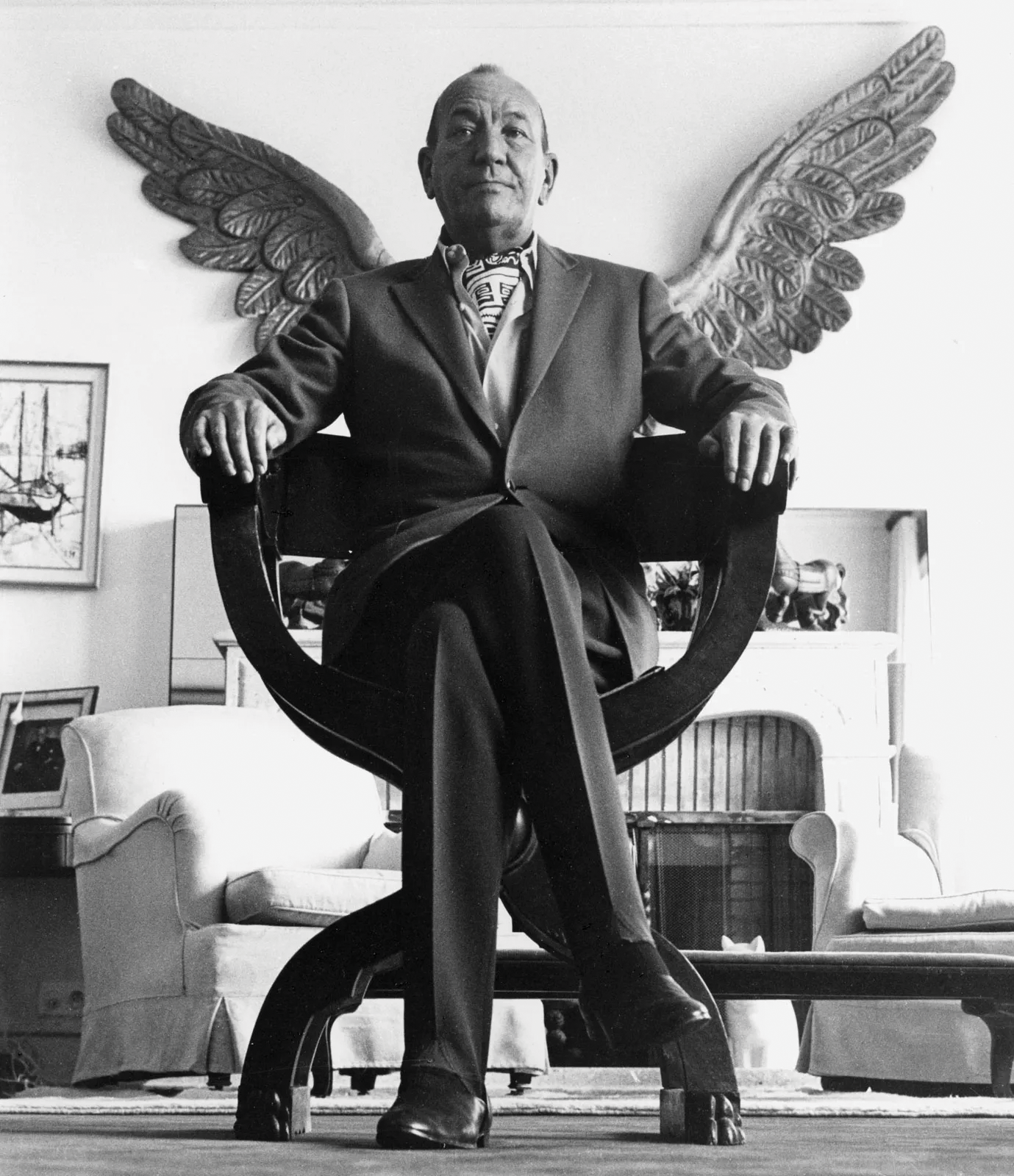
Noël Peirce Coward was born in 1899 and made his professional stage debut as Prince Mussel in The Goldfish at the age of 11, leading to many child actor appearances over the next few years. His breakthrough in playwriting was the controversial The Vortex (1924) which featured themes of drugs and adultery and made his name as both actor and playwright in the West End and on Broadway.
During the 1920s and 1930s, Coward wrote a string of successful plays, musicals and intimate revues including Fallen Angels (1925), Hay Fever (1925), Easy Virtue (1926), This Year of Grace (1928) and Bitter Sweet (1929). His professional partnership with childhood friend, Gertrude Lawrence started with the musical revue, London Calling (1923) and was followed by Private Lives (1931) and Tonight at 8.30 (1936).
During World War II, he remained a successful playwright, screenwriter, and director, as well as entertaining the troops and even acting as a spy for the Foreign Office. His plays during these years included Blithe Spirit (1941), which ran for 1997 performances, outlasting the War (a West End record until The Mousetrap overtook it), This Happy Breed and Present Laughter (both 1942). His two wartime screenplays, In Which We Serve, which he co-directed with the young David Lean as well as starring in, and Brief Encounter quickly became classics of British cinema.
However, the post-war years were more difficult. Austerity Britain—the London critics determined—was out of tune with the brittle Coward wit. In response, Coward re-invented himself as a cabaret and TV star, particularly in America, and in 1955 he played a sell-out season in Las Vegas featuring many of his most famous songs, including “Mad About the Boy,” “I’ll See You Again,” and “Mad Dogs and Englishmen.” This was followed by 3 live television specials on CBS including Together With Music with Mary Martin.
In the mid-1950s he settled in Jamaica and Switzerland, and enjoyed a renaissance in the early 1960s becoming the first living playwright to be performed by the National Theatre, when he directed Hay Fever there. Late in his career he was lauded for his roles in a number of films including Our Man in Havana (1959) and his role as the iconic Mr. Bridger alongside Michael Caine in The Italian Job (1968).
Writer, actor, director, film producer, painter, songwriter, cabaret artist as well as an author of verse, essays, autobiographies, and a novel, he was called by close friends “The Master.” His final West End appearance was Song at Twilight in 1966, which he wrote and starred in. He was knighted in 1970 and died peacefully in 1973 in his beloved Jamaica.
For further information on Noël Coward’s life and work, visit noelcoward.com.
The Company
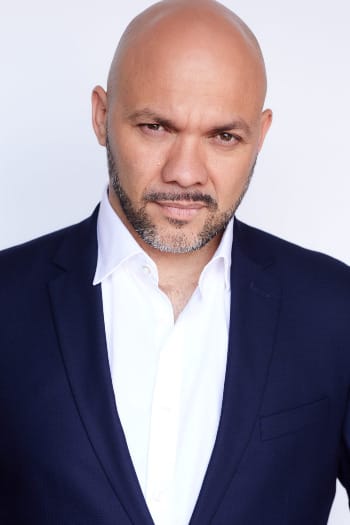
Hugo E Carbajal (Elyot Chase) is excited to reprise the role of Elyot and debut at A.C.T., bringing over 25 years of experience as an actor, director, and teacher. Carbajal has performed with renowned companies like Cal Shakes, San Francisco Mime Troupe, Alley Theatre, Arizona Theatre Company, Shotgun Players, Cuttingball, TeatroVision, Bay Area Children’s Theatre, Hartford Stage, Huntington Theatre, and Pacific Conservatory Theatre. Onscreen credits include SWAT, Bosch, Chance, Good Girls, and Brooklyn Nine-Nine. Follow his journey online via @hugoecarbajal or visit hugocarbajal.com

Gianna DiGregorio Rivera (Sibyl Chase) is a Bay Area-born actor and musician thrilled to be making their A.C.T. debut. Recent credits include American Mariachi (Alley Theatre), Hurricane Diane and The Importance of Being Earnest (Aurora Theatre), Romeo y Juliet (California Shakespeare Theater), Quixote Nuevo (Hartford Stage/Huntington Theatre/Alley Theatre/California Shakespeare Theater), and Arcadia (Shotgun Players). They hold a BA in Theater Arts from UC Santa Cruz and an MA in Sexuality Studies from San Francisco State University.
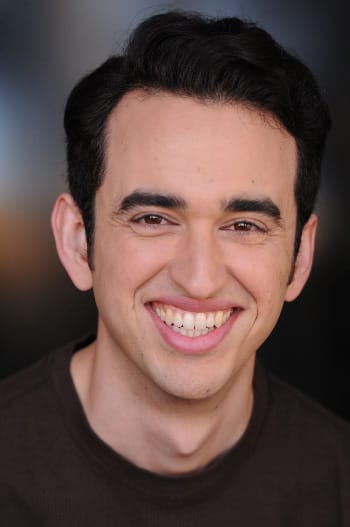
Brady Morales-Woolery (Victor Prynne) is thrilled to be making his A.C.T. debut. Other regional credits include: People Where They Are (San Jose Stage); 1984 and Born With Teeth (Aurora Theatre Company); Private Lives (Arizona Theatre Company); Clue (Center Rep); Romeo y Juliet and Twelfth Night (Cal Shakes); The Curious Case of the Watson Intelligence (Shotgun Players); Once (42nd Street Moon); Retablos (Word for Word); Barefoot in the Park and The Kentucky Cycle (Willows Theatre Company). Feature film credits include: Quitters, Pushing Dead, The Internship, and Avenue of the Giants. He holds a BA in Theatre from UC Berkeley. Visit bradymwoolery.com
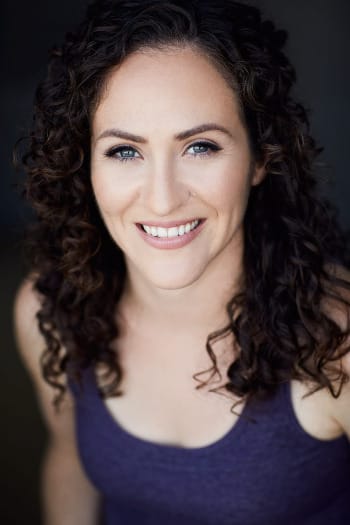
Sarita Ocón (Amanda Prynne) is honored to reprise the role of Amanda. A.C.T. credits include Fefu and Her Friends, Men On Boats, and A Christmas Carol. Regional theatrical credits: Alley Theatre, Arizona Theatre Company, Berkeley Repertory Theatre, BRAVA Theater Center, California Shakespeare Theater, Huntington Theatre, Los Angeles Theater Center, Oakland Theater Project, Oregon Shakespeare Festival, PlayMakers Repertory Company, Round House Theatre, San Francisco Playhouse, South Coast Repertory, Teatro Visión, and TheatreWorks Silicon Valley, among others. Awards include: TCG Fox Foundation Resident Actor Fellowship; Center for Cultural Innovation Investing in Artists Award; California Arts Council Local Impact Award; the RHE Foundation Artistic Fellowship.
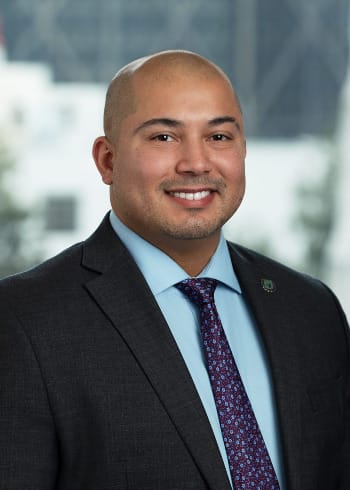
Bacilio Mendez II (U/S Victor Prynne / Elyot Chase) is pumped for his first A.C.T. production, after focusing on off-stage efforts as a Producing Fellow (PlayGround), Stage Management Fellow (Shotgun Players), and Playwright (SFBATCO Creators Lab). Before moving to San Francisco for Law/Business School at Golden Gate University, Mendez earned a Bachelor’s in Dance from Oberlin and a Master’s in Library & Information Science from Pratt. In New York City, Mendez served as a National Lawyers Guild W. Haywood Burns Memorial Fellow for Social & Economic Justice, an LGBT Bar Association of NY Law & Technology Fellow, and a NY State Unified Court System Nathan R. Sobel Law Library Fellow. Mendez is an attorney and a SAG and Equity member. More at bacilio.com. (he/him)
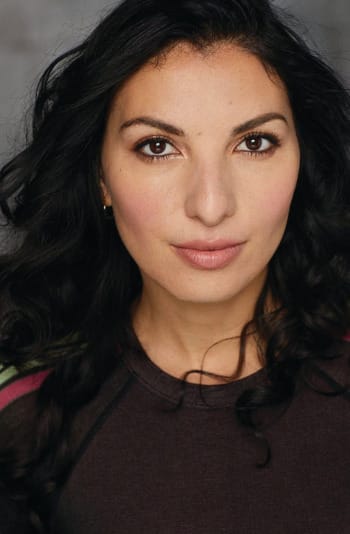
Livia Gomes Demarchi (U/S Sibyl Chase / Amanda Prynne) is thrilled to be making her A.C.T. debut! Recent credits: Jane/Le-Le-Wa-You in Manahatta at the Aurora Theater and Beatrice in Much Ado About Nothing at SF Shakes (both directed by Shannon R Davis). Other credits: Miri in Sapience (Playground SF and at the San Diego Rep Latinx Festival), the world premiere of Ghosts of Bogota (AlterTheater), Tania in Native Gardens (Center Rep), Olivia/Maria in Twelfth Night (Perspective Theater, TBA Winner for best ensemble) and Belmira in the original production of The River Bride (AlterTheater). Other theaters: SF Playhouse, The Magic, BRAVA, and Shotgun Players. She holds a BA in Theater and Performance Studies from UC Berkeley.
Noël Coward (Playwright) Click here.
KJ Sanchez (Director) is the founder and CEO of American Records, dedicated to making theater that chronicles our time, theater that serves as a bridge between people. She is a playwright and director and has worked at (select list) Cal Shakes, The Alley, The Guthrie, Hartford Stage, Huntington Theatre Company, The Alliance, Arizona Theatre Company, Berkeley Rep, Baltimore’s Center Stage, Cincinnati Playhouse in the Park, Playmakers Rep, Asolo Rep, Actors Theatre of Louisville, Two River Theater Company, Frontera Rep, Round House, Studio Theatre in D.C., Cornerstone Theater Company and Off-Broadway at Urban Stages, HERE Arts Center, and the Gene Frankel Theatre. KJ is a former member of Anne Bogart’s SITI Company, a current Associate Artist with The Civilians, the voice of many characters on the cartoons Dora the Explorer and Go Diego Go, a Fox Fellow, Douglass Wallop Fellow, and recipient of the Rella Lossy Playwright Award. She also teaches at UT Austin.
Tanya Orellana (Scenic Designer) has designed many shows at A.C.T. including Big Data, Fefu and Her Friends, and Poor Yella Rednecks: Vietgone 2. Select credits include What Became of US (Atlantic Stage 2), Derecho (La Jolla Playhouse), Mother Road (Berkeley REP), For The People (Guthrie Theatre), One of The Good Ones, Stew ( Pasadena Playhouse), Where Did We Sit on The Bus? (Denver Center Theatre Company), Heart Sellers (Milwaukee Rep), King of the Yees (Signature Theatre), Alma (Kirk Douglas), Somewhere Over The Border (Syracuse Stage), Private Lives, Justice (Arizona Theatre Company), American Mariachi (Alley Theatre), The Heath (Merrimack Rep). Education: MFA CalArts. Affiliations: La Gente: The Latine Production Network, Wingspace Theatrical Design
Jessie Amoroso (Costume Designer) is currently the costume director at A.C.T. where his costume design credits over the last 15 seasons include Testament, Ah, Wilderness!, Love and Information, Underneath the Lintel, Chester Bailey, John, Vietgone, Communion, Poor Yella Rednecks: Vietgone 2, and numerous MFA and YC plays. Bay Area theater design and styling credits include projects at Marin Theatre (Marjorie Prime and Torch Song), Romeo y Juliet at Cal Shakes (with many of his Private Lives collaborators), Aurora Theatre Company, Center Rep, California Theatre Center, Julia Morgan Theater, Solano College Theater, Berkeley City Club, Marines Memorial Theater, Herbst Theater, and The Palace of Fine Arts. At Theatre Artaud/Z Space he designed Caligua featuring Nancy Carlin and Round Heeled Woman starring Sharon Gless. Jessie is a graduate of California State University Hayward (now CSU East Bay) and a member of United Scenic Artists local 829. In 2022 he was bestowed an honorary MFA in acting from the conservatory and graduating class.
Scott Bolman (Lighting Designer) has designed lighting for theater, dance, and opera productions at venues throughout the world including the Athens and Epidaurus Festival, the Brooklyn Academy of Music, Judson Church, Lincoln Center, Melkweg (Amsterdam), Radialsystem V (Berlin), the Republican German Theatre (Kazakhstan), Studio Theater, The Wallis Center, Walt Disney Concert Hall, and the Yerba Buena Center for the Arts. Collaborations with Robert Wilson include Der Sandmann (Düsseldorfer Schauspielhaus), Zinnias (Peak Performances), and The Odyssey (National Theater of Greece). Scott is a founding member of Wingspace Theatrical Design and currently teaches lighting design at California State University Fullerton. More info at scottbolman.com. (he/him)
Jake Rodriguez (Sound Designer) is a sound designer and composer based in the San Francisco Bay Area. His recent credits include The Cassandra Sessions (Shotgun Players); Wintertime (Berkeley Repertory Theatre); Dear San Francisco (Club Fugazi); Top Girls (A.C.T.); Oedipus el Rey (Magic Theatre); Between Two Knees (Yale Repertory Theatre, Oregon Shakespeare Festival); The Great Leap (A.C.T.); Everybody (California Shakespeare Theater); Angels in America (Berkeley Repertory Theatre); A Thousand Splendid Suns (A.C.T., Theatre Calgary, Grand Theater, The Old Globe); and The Christians (Actors Theatre of Louisville, Playwrights Horizons, the Mark Taper Forum). Rodriguez is the recipient of a 2004 Princess Grace Award and received an honorary MFA from A.C.T. in 2021. Find sounds at soundcrack.net.
LISETTE PERELLE (Tango Instructor) Dynamic choreographer, Argentine tango instructor, actress, singer, and producer. Ms. Perelle has performed with Boston’s Northeastern Dance Theater (1986-88) and Ballet Pampa Argentina (2001-03), appearing in leading roles in Curse of the Starving Class, Nude with Violin, Working, Tango Fatal, Love Junkies, and more. Her TV credits include Univision and KQED San Francisco, and she won Canada’s Lotus Award for Best Producer of a PSA (1996). She has judged competitions and trained competitors winning first and second places for Argentine Tango Championship USA. She teaches in the Bay Area and Organizes Milonga Rubia.
Joy Meads (Dramaturg) a native of Oakland, is director of dramaturgy and new works at American Conservatory Theater. A.C.T. credits include Big Data, Hippest Trip – The Soul Train Musical, Poor Yella Rednecks: Vietgone 2, The Headlands, Fefu and Her Friends, Communion, Testmatch, Wakey, Wakey, Sweat, Men on Boats, Edward Albee’s Seascape, Her Portmanteau, The Great Leap, and Rhinoceros. Prior to A.C.T., she was literary manager/artistic engagement strategist at Center Theatre Group. CTG credits include Archduke, Good Grief, Appropriate, Forever, Marjorie Prime (2015 Pulitzer Prize finalist), A Parallelogram, The Royale, and Sleep (also: Brooklyn Academy of Music and Yale Repertory Theatre). Previously, Meads was literary manager at Steppenwolf Theatre Company and associate artistic director at California Shakespeare Theater. Meads is a co-founder of The Kilroys. (she/her)
Katie Craddock (Casting) is the literary manager and casting associate at A.C.T. Her favorite casting processes here so far include The Headlands, The Wizard of Oz, Big Data, and workshops of commissions by Aleshea Harris, Eisa Davis, Craig Lucas, RyanNicole Austin & Adesha Adefela & Beau Lewis, Anne Washburn, and Kate Attwell. Previously she was the artistic associate at Berkeley Rep, where she supported season planning, casting, and dramaturgy, mentored artistic fellows, moderated postshow discussions, taught playwriting and dramaturgy to teens, served on the board/staff antiracism taskforce, and facilitated the making of new plays at The Ground Floor. (she/her)
LeeAnn Dowd (Casting) is an artist and producer who has worked with with Lower Bottom Playaz, California Shakespeare Theater, Berkeley Repertory Theatre, Center Repertory Company, TheatreWorks Silicon Valley, Shotgun Players, Theatre Bay Area, and TheatreFIRST. In her time as Artistic Producer & Casting Manager at Cal Shakes, she is most proud to have supported productions that expand an understanding of “classical theater” to include epic stories of the global majority, such as: black odyssey by Marcus Gardley, Quixote Nuevo by Octavio Solis, House of Joy by Madhuri Shekar, and The Good Person of Szechwan directed by Eric Ting. LeeAnnDowd.com (she/her)
Laura Hicks (Stage Manager) is a Bay Area stage manager originally from Alabama. In the Bay Area, she has been a stage manager for TheatreWorks’s New Works Festival, Aurora Theatre’s 1984, and ASM for TheatreWorks’s Steel Magnolias, Tiger Style, and Being Alive. She was the resident stage manager with Red Mountain Theatre in Birmingham for several years, where she was the stage manager for Rogers and Hammerstein’s Cinderella, Holiday Spectacular, and their Performing Ensemble program. Additional stage manager credits include Die Fledermaus (Sacramento Philharmonic & Opera), 1776 (Virginia Repertory Theatre), The Velveteen Rabbit (Virginia Repertory Theatre), and Glory Denied (Opera Birmingham).
Julia Formanek (Assistant Stage Manager) is a Bay Area–based stage manager. Formanek is excited to return to A.C.T. after previously working on A Strange Loop and Hippest Trip – The Soul Train Musical. Other regional credits include Let The Right One In, Cambodian Rock Band, Goddess, Culture Clash (Berkeley Repertory Theatre), Sleeping Beauty: Panto in the Presidio (Presidio Theatre), Romeo y Juliet, House of Joy, and Everybody (California Shakespeare Theatre).
Morgan Bright, Stage Management Production Assistant
Rylee Cagle, Production Department Production Assistant
Kristen Campbell, Wigs, Hair, & Makeup Crew Supervisor
Dave Maier, Fight Director
Vinh G. Nguyen, Assistant Director
Russ Souza, Props Head Lottie Thorsen, Wigs, Hair, & Makeup Crew Cover
Emma Walz, On Book Production Assistant
SPECIAL THANKS
Arizona Theatre Company
Private Lives Throughout the Years
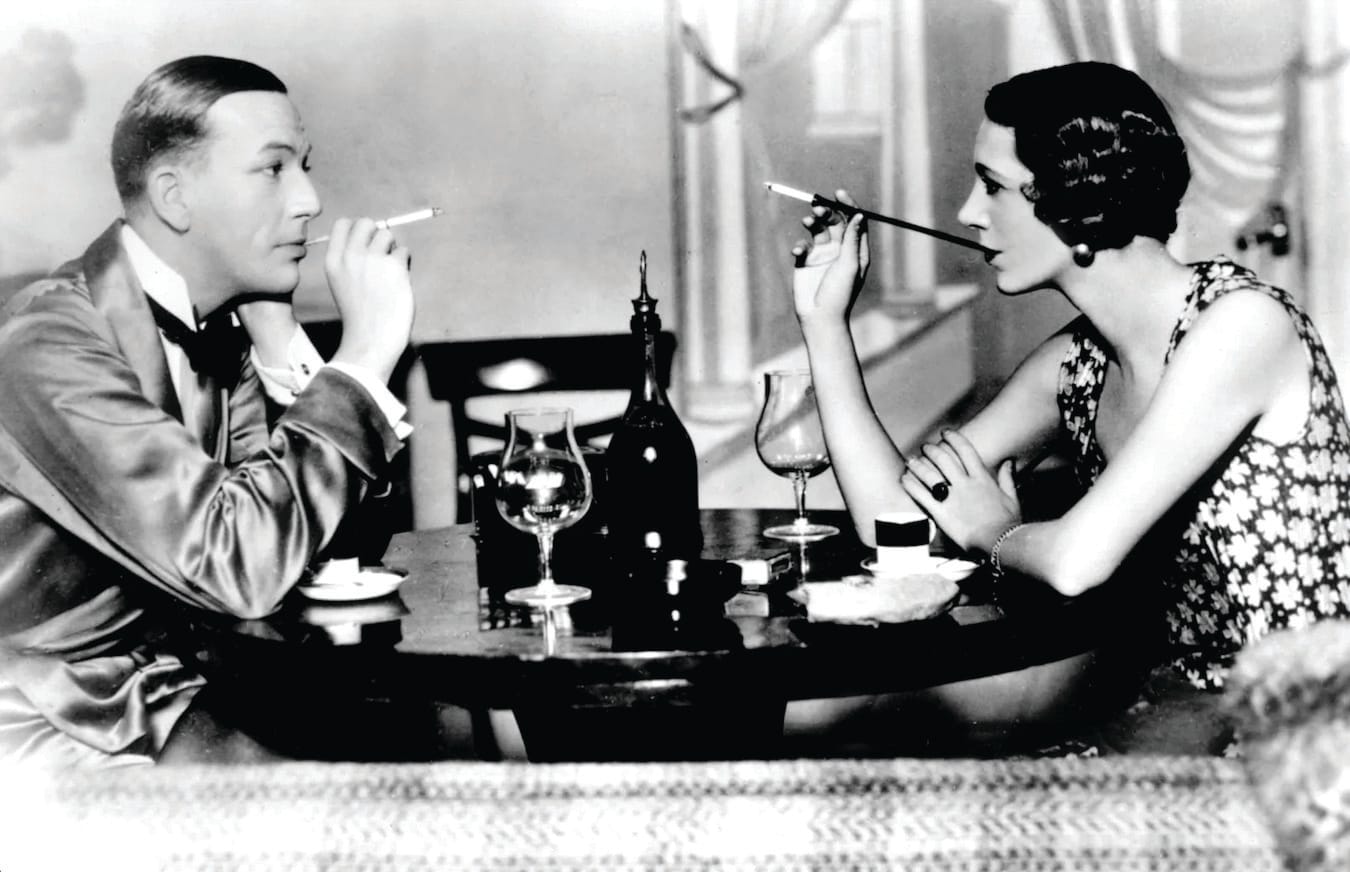
1930
Premiered in London, starring Noël Coward, Gertrude Lawrence, Adrianne Allen, and Laurence Olivier.
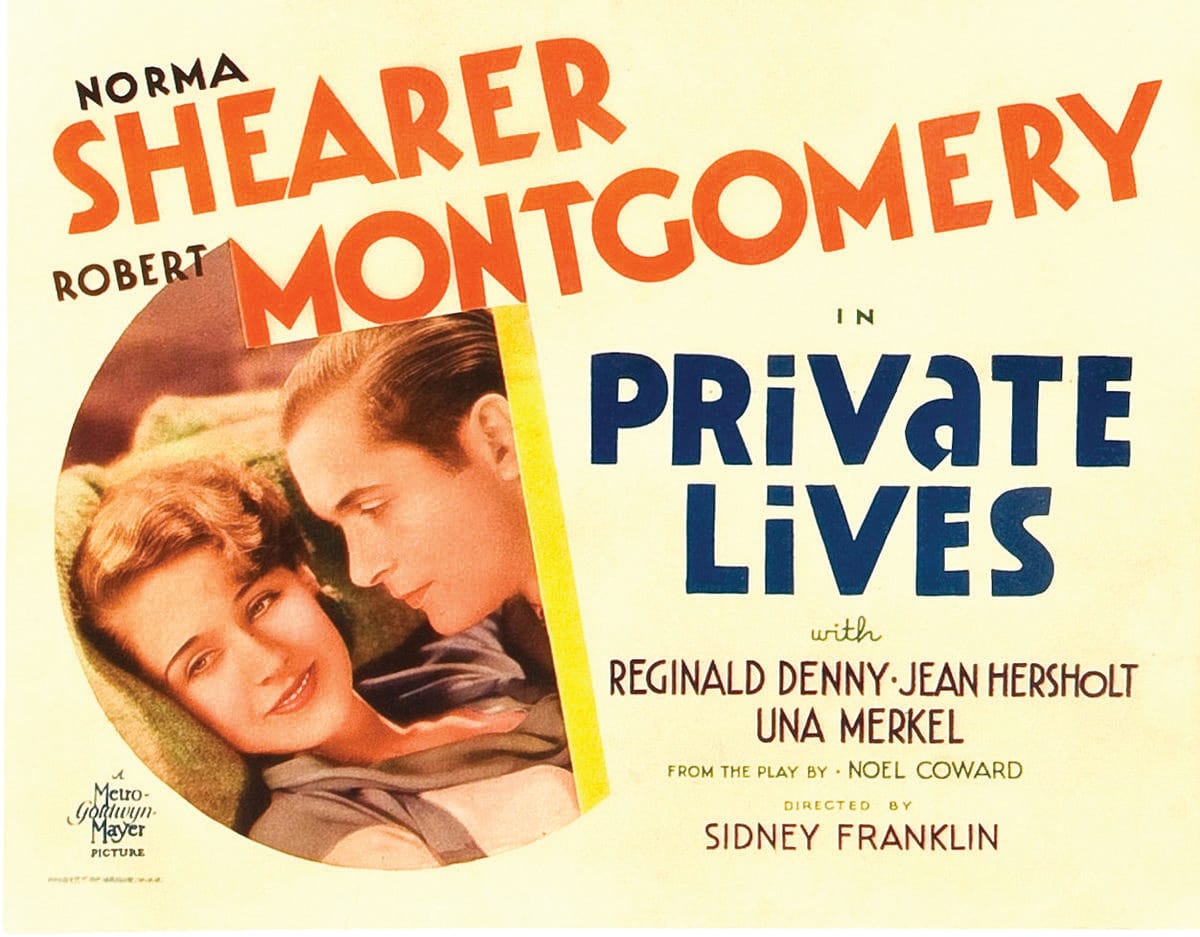
1931
First film adaptation directed by Sidney Franklin and starring Norma Shearer as Amanda and Robert Montgomery as Elyot. Coward thought it “passable”.
1939
CBS Radio aired an hour-long adaptation of the play by Orson Welles, starring Welles as Elyot and Gertrude Lawrence reprising her stage role as Amanda.
1944
West End revival, starring John Clements and Kay Hammond.
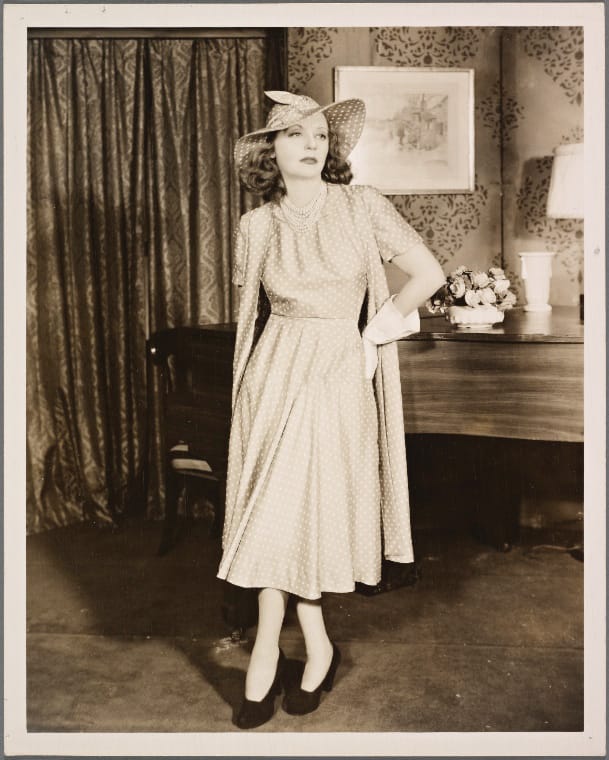
1948
Broadway revival, starring Tallulah Bankhead as Amanda. The production toured all but three states of the U.S., and grossed more than $1.5 million.
1968
Off-Broadway production directed by Charles Nelson Reilly, starring Elaine Stritch as Amanda.
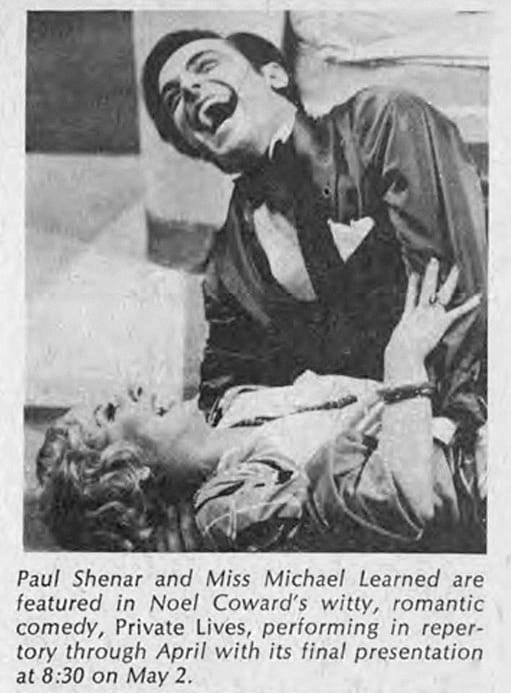
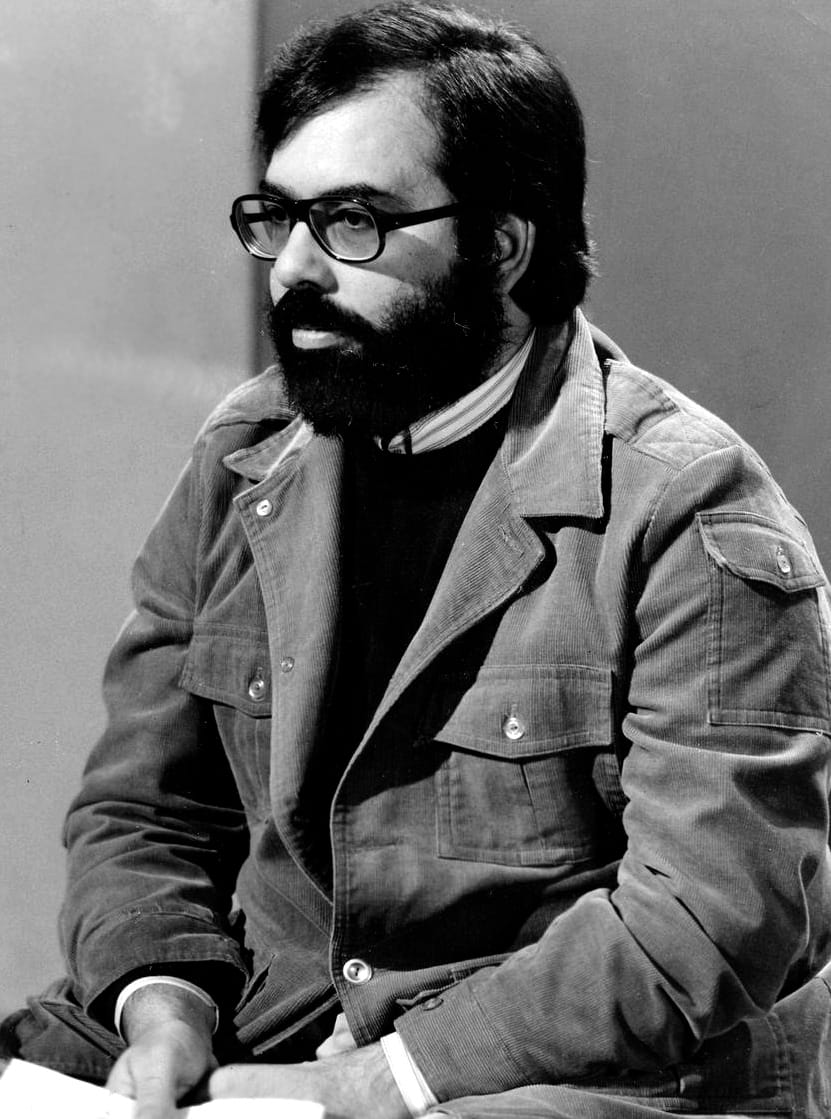
1972
Francis Ford Coppola directs A.C.T.’s first production of the show, starring Deborah Sussel, Michael Learned, Paul Shenar, and Jay Doyle.
1972
The last revival during Coward’s lifetime, at London’s Queen’s Theatre. Directed by John Gielgud and starring Maggie Smith and Robert Stephens, the production transferred to Broadway in 1975.
1976
BBC production starring Alec McCowen and Penelope Keith.
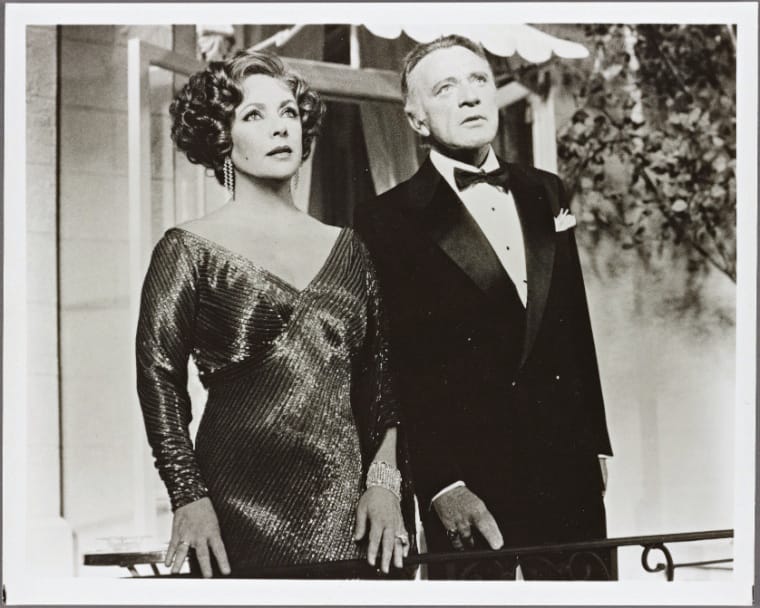
1983
Broadway revival starring Elizabeth Taylor as Amanda and Richard Burton as Elyot. This production also toured to Washington, DC, Chicago, and LA in the same year.
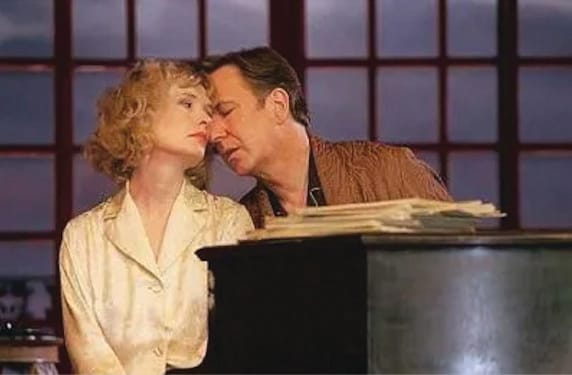
2001
London revival emphasized the harshness and darker side of the play; it starred Alan Rickman and Lindsay Duncan, directed by Howard Davies at the Albery Theatre (subsequently renamed the Noël Coward Theatre).

2010
BBC Radio 4 broadcast a new adaptation of the play directed by Sally Avens, starring Helena Bonham Carter as Amanda and Bill Nighy as Elyot.
Print Edition
